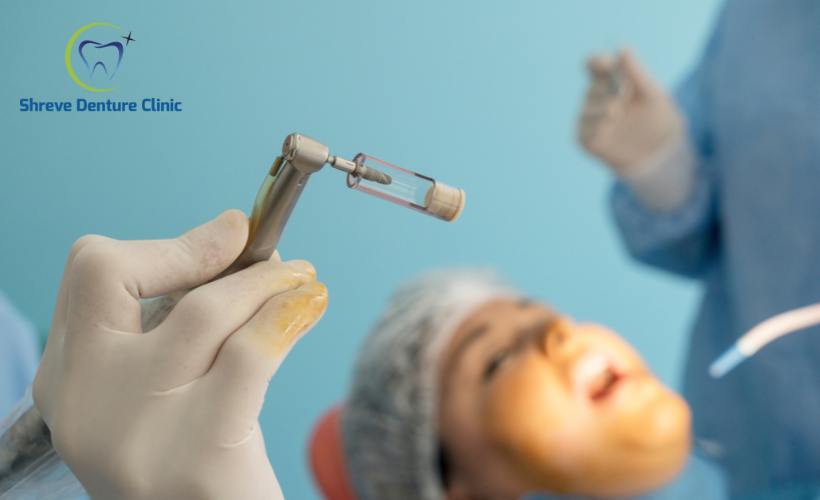If you are looking for a permanent solution to missing teeth, then dental implants are the way to go. Unlike traditional dentures that are completely removable, these dentures attach to implants that are surgically inserted into your jawline.
They offer a much more natural look and feel. However, the prospect of having surgery can seem incredibly daunting. Then, there’s caring for the implant site in the aftermath.
To help you navigate your post-operative care regimen, we have broken it down. Keep reading to find out how to best care for your new teeth.
Are Dental Implants Better Than Regular Dentures?
The short answer is yes, they are. Implants are designed to mimic the look and feel of natural teeth. They offer greater stability and stimulate the underlying jaw bone, preventing bone loss.
Although they are the more costly option, implants are also more durable, providing many years of faithful use with proper care.
An Overview of the Dental Implant Procedure
Dental implant surgery involves the extraction of the damaged tooth. Once it has been removed successfully, the jawbone is allowed to heal before the implant surgery takes place.
Then, the dentist will surgically insert a titanium post into the jawbone, which anchors to the bone. When the post has been inserted, a healing abutment is placed on the implant to help with the recovery and shape the gum tissue.
Once the implant procedure is done, the bone is allowed time to fuse with the implant through a process known as osseointegration. Then, the healing abutment will be replaced with a permanent one, and a custom crown will be placed. This process results in a more natural-looking denture.

How to Care for the Implant Site After Oral Surgery
Follow these steps to support your body throughout the healing process and prevent any complications.
Avoid Rubbing Your Tongue or Fingers Against the Surgical Site
The truth is that it might be tempting to feel the area after surgery, but doing so could expose you to the risk of infection. It can also dislodge the blood clot that has already started forming. Moreover, agitating the area could cause swelling and force the implants to move.
That’s the last thing you want after dental implant placement.
So, don’t run your tongue along the surgical site, and avoid sticking your fingers in your mouth.
Don’t Rinse Your Mouth in the First 24 Hours
After the procedure, you’ll likely see bleeding. This is normal. One of the first things you might want to do is rinse your mouth.
While this may seem like a harmless activity, you should avoid it in the first 24 hours. That’s because rinsing can dislodge the clot and disrupt the healing process, causing more bleeding.
Moreover, aggressive rinsing can also introduce bacteria to the area. Once the 24-hour period has ended, use warm salt water to gently rinse your mouth. Avoid forceful spitting and allow the water to drip out naturally.
In addition to rinsing, do not brush your teeth within the first day after the implant placement. Be sure to follow your dentist’s advice on when and how to brush after your surgical procedure.
Don’t Worry Too Much About the Bleeding
Many patients become really worried when they notice bleeding in the gums after surgery. However, this is completely normal. If you notice excessive bleeding after the first 24 hours have passed, then you’ll need to get in touch with your dentist.
Suppose there is excessive bleeding within that initial 24-hour period. In that case, you can bite down on gauze to stop it.
Use an Ice Pack to Deal with Swelling
In addition to bleeding, swelling is also common after dental implant surgery. That’s because invasive procedures trigger the body’s inflammatory response, sending fluids and white blood cells to the affected area. It also brings more oxygen and nutrients to the site to promote faster healing.
If the inflammation is excessive, however, you can use an ice pack to reduce the swelling and get some relief from the pain.
Take Pain Medication If You Need It
Most dental implants are inserted under local anesthetic. However, in some cases, a general anesthetic may be used.
Regardless of which option was used when your implants were placed, the effects will eventually wear off, which could result in pain. Follow your dentist’s instructions and take your pain medication when you need it.
Eat Soft Food
For a few days after oral surgery, you will likely need to eat soft food and stay away from hot liquids. However, be sure to discuss this with your dentist, as it could vary from person to person.
Follow the Instructions Your Dentist Gives You
Your dentist will give you a set of post-operative instructions to help you care for your surgical site. Make sure that you are following them. If you notice any of these symptoms, get in touch with your dentist:
- Intense pain. It’s normal to have pain after oral surgery. But, if the pain gets more intense, then it might indicate an infection or implant failure.
- Fever. This would indicate the presence of an infection and should be treated with antibiotics.
- Uncontrollable bleeding. If the bleeding does not subside but worsens and continues after the initial 24 hours post-surgery, seek immediate care.
- Unstable implant. Should the implant or healing abutment move, contact your dentist.
How to Take Care of Your Dental Implants
If you want your dental implant to last a long time, then it’s important to maintain proper oral hygiene. Here are a few things to do to promote the longevity of your implants:
- Brush twice a day. Using a soft bristle toothbrush, brush your natural teeth and dentures in the morning and at night.
- Floss. It’s also advisable to use floss to remove plaque and food particles that are stuck between your implants.
- Visit your dentist regularly. Have your teeth professionally cleaned every six months.
- Avoid certain foods. Food that is sticky or chewy should be avoided, as it can put too much pressure on your implants. Hard candies, nuts, and other types of foods can also cause damage.
- Don’t smoke. Smoking can slow down the healing process and increase the risk of implant failure.
- Avoid alcohol. Alcohol can also affect bone integration and should be avoided post-surgery.
Need Dental Implant Surgery? Contact Shreve Dental Clinic Today!
Implant placement can seem incredibly scary. But, with our team of dental practitioners on your side, you can rest assured that you will get the best possible post-care advice.
Shreve Dental Clinic is committed to offering reliable services and can help restore your smile with natural-looking dentures!

To learn more about our services or schedule an appointment, dial 519.322.5900 today.








